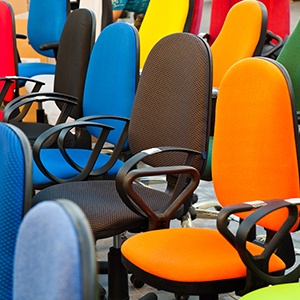
Indeed, instead of replacing your furniture with new items or sourcing items in the used furniture market, it may be viable, economical and ecologically responsible to see what can be repurposed. Below, we highlight three tips to help you maximize this opportunity and, ideally, save thousands of dollars:
1. Itemize Your Inventory
Instead of trying to remember all of the items that may be suitable for repurposing, simplify the process by taking an inventory. You can use a simple spreadsheet for this process, or if you’re more technically inclined (or can get some help from the IT staff), you may wish to create a basic database.
The idea here is to list and briefly describe each item, in terms of what it is (e.g. workstation), the general condition (e.g. safe and functional, with some minor scratching), and the location (e.g. meeting room B). Without getting too fancy, you may also want to add photos taken by a smartphone or tablet.
2. Talk to Managers and Supervisors
Managers are typically in a better position to know if their teams need additional or replacement furniture. For example, certain teams may be obliged to fit 2 people into a workstation that was optimally designed for 1, or conversely, some workstations or cubicles may be larger than necessary.
Share your inventory (per #1) with the management team, and invite them to note whether they’d be interested in a particular item. Make sure you put a deadline on this, and clarify that you are not “taking orders”. You are simply seeing if there is a need.
3. Determine Refurbishing Costs
Some items may need significant repairs or refurbishing, such as worn down – and possibly no longer safe – office chairs. However, other items may be quickly and cost effectively restored with a fresh coat of paint, a thorough cleaning, scratch repairs, and so on. Put together a general estimate of the costs involved, so that you can get a better idea of the savings vs. buying new or used.
4. Refurbish, Repurpose – and then Donate or Recycle
Once you’ve decided which items can be cost-effectively refurbished, then repurpose them accordingly to various teams (each organization will have its own criteria for doing this).
And what about the remaining furniture that is either not worth refurbishing, or does not have a new home? Those items can be donated to a local charity, or they can be appropriately recycled.
Learn More
At Key Interiors, we have over 30 years of experience helping clients repurpose their office furniture and save thousands of dollars – which keeps their renovation on budget, affordable and rewarding. Contact us to learn more.